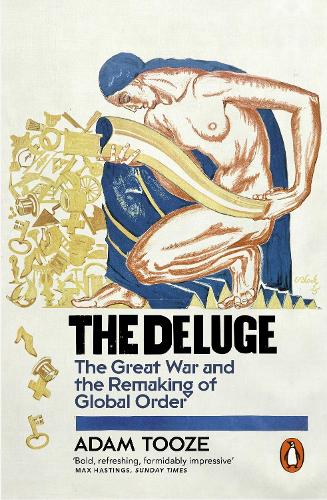
The Deluge: The Great War and the Remaking of Global Order 1916-1931
(Paperback)
Publishing Details
The Deluge: The Great War and the Remaking of Global Order 1916-1931
By (Author) Adam Tooze
Penguin Books Ltd
Penguin Books Ltd
22nd April 2015
5th March 2015
United Kingdom
Classifications
General
Non Fiction
First World War
909.82
Physical Properties
Paperback
672
Width 129mm, Height 198mm, Spine 31mm
482g
Description
A panoramic history of the First World War that explains why its legacy continues to shape the modern world In the depths of the Great War, with millions of dead and no imaginable end to the conflict, societies around the world began to buckle. A new global order was being born. Adam Tooze's panoramic book tells the radical story of the struggle for global mastery from the battles of the Western Front in 1916 to the Great Depression of the 1930s. The Deluge is both a brilliantly illuminating exploration of the past and an essential history for the present.
Reviews
A remarkable new synthesis which draws on [Tooze's] two particular areas of expertise, Eurasia and especially Germany, and the global financial system revolving around London ... the great strength of his book is that he invites us to look at familiar events in unfamiliar ways ... Tooze's account brims with contemporary resonances ... He is too good a historian, however, to turn this into a simple argument for Keynesian deficit financing ... the general public and policymakers alike will - must! - turn to Adam Tooze for instruction -- Brendan Simms Tablet It is particularly refreshing to read Adam Tooze's book ... it confirms his stature as an analyst of hugely complex political and economic issues ... Tooze's book covers a huge geographical sweep ... he shows himself a formidably impressive chronicler of a critical period of modern history, unafraid of bold judgements -- Max Hastings Sunday Times
Author Bio
Adam Tooze is Barton M. Biggs Professor of History and Director of International Security Studies at Yale University. He taught for many years at the University of Cambridge. His last book, The Wages of Destruction, was universally acclaimed as one of the most important books written on the Third Reich. It was shortlisted for the Duff Cooper Prize and won both the Longman-History Today Book of the Year Prize and the Wolfson Prize for History.
